Proper Science KS3 - individual topics
Proper Science KS3 - individual topics
Couldn't load pickup availability
Please select a product option.
Try one topic and if you then buy the course you'll get a refund for that topic.
Are you following a KS3 curriculum that's stuck in ‘surface learning’ mode? Why not switch to Proper Science - a curriculum designed for ‘deep, transferable learning’?
Why is Proper Science ideal for deep, transferable learning?
Surface learning courses 'cover' the ideas that are easy to transmit. Proper Science focusses on:
- explaining phenomena with key concepts
- integrating working scientifically into each lesson
- cognitive strategies for apply and analyse
- tasks to develop 21st century learning skills
- engaging contexts and real-life problem
Note: these are individual topics - 2/3 topics make one unit. See below for the topic list. Please add the topic name(s) in the order notes.
What's included
Each key concept is divided up into learning cycle stages:
Activate Pre-assessments to check prior concept understanding
Acquire Explorations to build concepts by explaining phenomena
Apply (Practice Book, sold separately) Extensive problem-solving
Assess Diagnostic quizzes to identify weak understanding
Analyse Challenges to use higher-order thinking

Plus there's a summative assessment:
Test Exam-style quiz to measure progress in acquire (AO1), apply (AO2) and analyse (AO3)
The materials cover the 6 learning stages for each of the 22 key concepts in Year 7, and 23 key concepts in year 8 of the 5-year plan. Here is a list of what's included for each stage. To see examples, Download the free Year 7 Cell Structure topic
Activate
- Pre-assessment tasks: short activities to check understanding of an essential prior concept, diagnose and reveal misconceptions
- Teachers guides, with answers and ideas for follow-up
Acquire
- 40-50 fully-resourced acquire lessons: engaging phenomena, exploratory activities and crystal clear, in-depth explanations to help students gain full understanding
- Single or multiple lessons depending on the complexity of the concept
- PowerPoint presentation backbone with high-quality visuals
- Student activity sheets
- Teachers guides with slide-by-slide running the lesson notes
- Technicians guide, with practical details
Apply (see Mastery Practice Book)
- 50 sets of problems set in new contexts for application of knowledge
- Detailed worked examples using Detect, Recall, Solve strategy
- Your turn practice questions, hints and answers
- In book form or in digital form
Assess
- Diagnostic quizzes to test understanding and application
- Self-assessment feedback sheets
- Teachers guide with question specification
- Reassess quiz - for students to have a second chance, an opportunity to do rethinking on areas where they struggled
Analyse
- Challenging tasks to develop higher-order thinking, where students have to interpret new information with conceptual understanding
- Scaffolds with and hints, and model answers
Test
- Summative quizzes which can be combined to make end-of-unit or end-of-term tests
- Divided into understanding (AO1), application (AO2) and analysis (AO3)
- Teachers guide with mark scheme
Plus
- Unit guides with a summary of all the components and advance planning information
Proper Science is delivered electronically. Most files are pdf format. Acquire presentations are in editable PowerPoint format.
Year 7 topics
Contact forces unit
Download unit planner for details
Topics (Key concepts):
- Balanced/unbalanced
- Friction
- Density
Substances & particles unit
Download unit planner for details
Topics (Key concepts):
- Particle model
- Mixtures
- Solutions
Cells unit
Download unit planner for details
Topics (Key concepts):
- Cell structure
- Specialised cells
Reproduction unit
Download unit planner for details
Topics (Key concepts):
- Sexual/asexual
- Menstrual cycle
- Embryo development
Interdependence unit
Download unit planner for details
Topics (Key concepts):
- Feeding relationships
- Competition
- Abiotic & biotic factors
Changing substances unit
Download unit planner for details
Topics (Key concepts):
- Chemical & physical
- Acids & alkalis
Note: in Version 2 the topics of pH scale and neutralisation have been combined into 1 bigger topic called 'Acids & Alkalis'.
Electric circuits unit
Download unit planner for details
Topics (Key concepts):
- Electric current
- Resistance
Energy transfers unit
Download unit planner for details
Topics (Key concepts):
- Energy
- Wasted energy
- Heat & temperature
Year 8 topics
Movement unit
Download unit planner for details
Topics (Key concepts):
- Speed
- Motion graphs
Electrical energy unit
Download unit planner for details
- Electric force
- Voltage
Light unit
Download unit planner for details
Topics (Key concepts):
- Reflection
- Refraction
Gravity unit
Download unit planner for details
Topics (Key concepts):
- Weight
- Gravitational force
- Solar system
Pure substances unit
Download unit planner for details
Topics (Key concepts):
- Elements or compounds
- Simple or giant
Reactants & products unit
Download unit planner for details
Topics (Key concepts):
- Oxidation
- Acid reactions
Earth systems unit
Download unit planner for details
Topics (Key concepts):
- Earth processes
- Potable water
Tissues & organs unit
Download unit planner for details
Topics (Key concepts):
- Gas exchange
- Cell organisation
- Digestive system
Respiration unit
Download unit planner for details
Topics (Key concepts):
- Aerobic respiration
- Anaerobic respiration
Life diversity unit
Download unit planner for details
Topics (Key concepts):
- Variation
- Selective breeding
- Adaptation
Sample material
Download samples from Acquire activities
Download samples from the Cells unit
Download samples from the Substances & particles unit
FAQ
How has the course changed since the original 'Complete Mastery'? The year 7 course has been thoroughly revised, after trialling to make the materials easier to use. They have much more explicit teaching, differentiation, plus new topical science contexts.
Are all the acquire lessons like the sample, cell structure? No, they're all different. We want to engage students with a wide range of interests, and give them a wide range of experiences of doing science. Each lesson starts with a context - a reason to learn the concept. Some are mysterious phenomena, some explore contemporary issues, some have students taking scientific roles, and a few reconstruct the original discovery of the science idea. See some of the contexts from Y7 Acquire lessons.
What is included or not included in Proper Science ? It includes teaching and assessment materials for all the 22 key concepts in year 7. For each one there is a pre-assessment (Activate), one or more fully resourced lessons (Acquire), diagnostic quiz, feedback and parallel quiz (Assess), challenging task (Analyse) and summative assessment (Test). The year 7 Practice Book is an optional extra not included in the pack.
How is it a mastery course? First, the learning objectives go beyond knowledge recall. They are designed for students to succeed at all the 3 assessment objectives Acquire (AO1), Apply (AO2) and Analyse (AO3). Second, each teaching sequence offers strong support for building students' knowledge, understanding and skills. Third, there are two formative assessment stages built-in - Activate and Assess, so you can decide if students need more learning opportunities before moving on.
How does the work change in terms of difficulty as you progress through each year? The Key Concepts progress in difficulty from year 7 to year 8 and onwards. The curriculum map is a learning progression within each Big Idea. Later Key Concepts are more theoretical and more quantitative, and require students to integrate earlier ones. If you are using Proper Science, you can also control the difficulty level - how much of the scientific thinking we put into the course that you hand over to the students.
Is there any planned timing for each unit/section/topic and each year of Blueprint? Yes, there is an estimated time for each stage of each Key Concept teaching and for each unit overall. The content in each year is designed to be approximately a year's worth. However, there is a big variation across schools in the number of lessons for science, and obviously a variation in the rate at which students learn. In the mastery model curriculum time is a variable, especially in year 7 and we have spread out the topics so that students have enough time to gain understanding.
To allow enough time to finish all the topics in the 5 years of Blueprint, Year 11 is deliberately about half the size of Year 10. This should allow schools to go slower in earlier years if needed, and still finish the whole curriculum.
Any advice on how we could manage students joining the school in the middle of the 5 years ie Yr 9 or Yr 10 rather than yr 7? From year 9 onwards you will have the detailed Blueprint planners to guide the structuring of content. From year 9-11, the content is, of course, the same as existing courses, but has been reordered and reprioritised. Each topic tells you what the prior ideas are. So this is the place to start with new students, making sure they have the prior understanding needed before teaching the new Key Concepts. New students may also be unused to the emphasis on scientific thinking and enquiry so may need more support at the beginning.
Is there a textbook to accompany the course? Yes. It's called Understanding Science and it's designed from first principles to help all abilities grasp the difficult ideas. See more details about Understanding Science.
Is there a programme for Years 9-11?
We currently offer 3 products to support a mastery curriculum.
1) Blueprint 5-year plan, which maps out all the key concepts, skills, progression, and which year/unit to teach each concept. For each, it provides an outline of the teaching sequence with detailed knowledge descriptors and the kinds of activities students need to do to acquire, apply and analyse. This covers Y7-11 and the basic version with 100 concept planners is free. Y7/8 was published last year and the new version being published this term.
2) Proper Science , a Y7 and Y8 programme with all the materials and assessment to teach towards AO1, AO2 and AO3, using big ideas and mastery approach. This is currently only for Y7-8. We are considering a lighter version for Y9.
3) Apply Practice Books, train students in applying knowledge. There is a Y7, Y8, and Y9 book and the Y10-11 book is in development. Each covers all the key concepts for that year.
In summary: products 1) and 3) are available for Y10-11 but not 2). We will also be producing tasks and performance assessments that cover year 9. We also expect that schools using Proper Science in year 7 and 8 will be able to translate the strategies to year 9-11 with fewer curriculum resources than we provide in year 7-8.
What about students doing triple students?
Blueprint 5-year plan currently covers combined science only. It is fairly straightforward to adapt it for separate science. It is mainly adding extra content - to certain units - with just a few extra Key Concepts.
Are all the AQA GCSE spec points hit through teaching? Exact examples are needed as the exam quotes these in the mark scheme.
Yes, Blueprint covers all of the AQA Combined Science specifications. The planners will give the GCSE reference, statement by statement where each spec point is taught. The planners indicate the depth of knowledge - whether it is a low-level concept or a complex understanding that has associated Apply and Analyse objectives.
Is Blueprint only matched to AQA Combined trilogy Spec?
The main ideas in each Key Concept cover all the Combined Science specifications, as they are very similar. There are differences at the individual statement level, which is where we have matched AQA.
We are producing a document showing the statements in OCR/Edexcel which are not explicitly mentioned so schools can add these to the relevant topics.
How much development or planning does the school need to do?
Once you have Proper Science, you have plans and resources for the lesson and assessments. Any course needs some adaptation: sometimes you will want to add extra activities to give students extra support and sometimes more extended practicals. Because there are only approx 23 Key Concepts per year, there is space for this. You will also need to sometimes add more differentiation. We give suggestions and options but do not provide multiple versions of every activity.
The other work is CPD - getting teachers to understand the approach, and because lessons might take an unfamiliar approach, the important habit of reading lesson guides to understand before teaching. We have taken feedback from schools and are working on adding more guidance for teachers, and options for differentiation - this will appear in future updates to the course.
How can we schedule teaching throughout the 5 years?
The 5-year curriculum map shows the key concepts/units planned for each year. There are approx 22-23 per year, allowing 1-1.5 weeks for teaching each. Units vary in length depending on the number and complexity of concepts. The planner shows approx timings for each learning stage (5As).
In Y7 we recommend being flexible on unit timings to get the benefit of mastery. Ie if you take time to do all the lessons as intended more students will reach a high level of understanding, and this will enable them to grasp more complex concepts at GCSE. The formative assessments (Activate, Assess) will tell teachers whether students can progress or need more learning time.
When will I get the materials?
After we receive payment, we create a pack that is personalised to each school, with a license name. Then we send the nominated teacher a message with the access details. This process takes 1-2 days.
How are the materials delivered? The materials are electronic downloads using Dropbox. Most of the materials are in pdf format. The Acquire presentations are in PowerPoint format as they contain some animation. You can see what is provided for teaching and assessing each concept, by clicking 'sample materials'
Is Proper Science like OUP's Activate course (Kerboodle)? Not really. The main educational difference is that Proper Science is designed from scratch to meet the demands of the Blueprint, 5-year big ideas curriculum and the new GCSE. It is not a collection of resources, but a systematic approach based on learning stages, and a mastery model. Also, Proper Science is a one-off purchase and not a yearly subscription like OUP's course.
Using a Purchase Order? Add a customer note with the PO number during checkout. Your confirmation email will include a link to the invoice to pay.
Need our details? You can download the company details. This includes contact information and bank details. Contact us for further information.
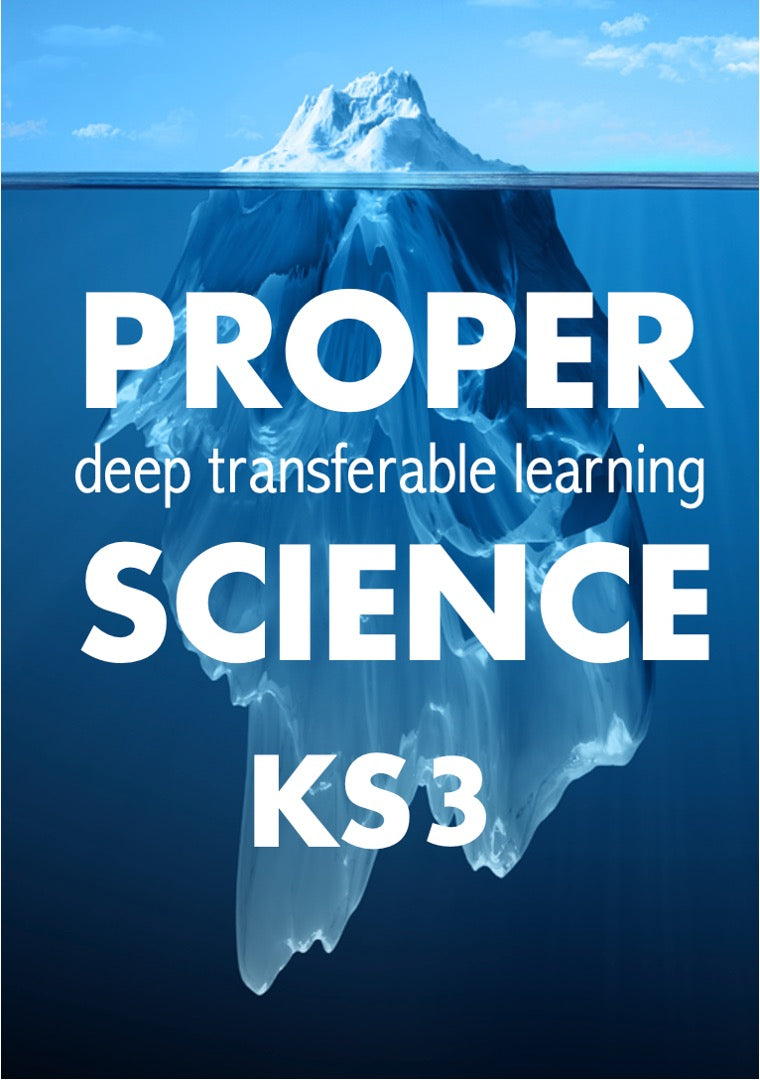
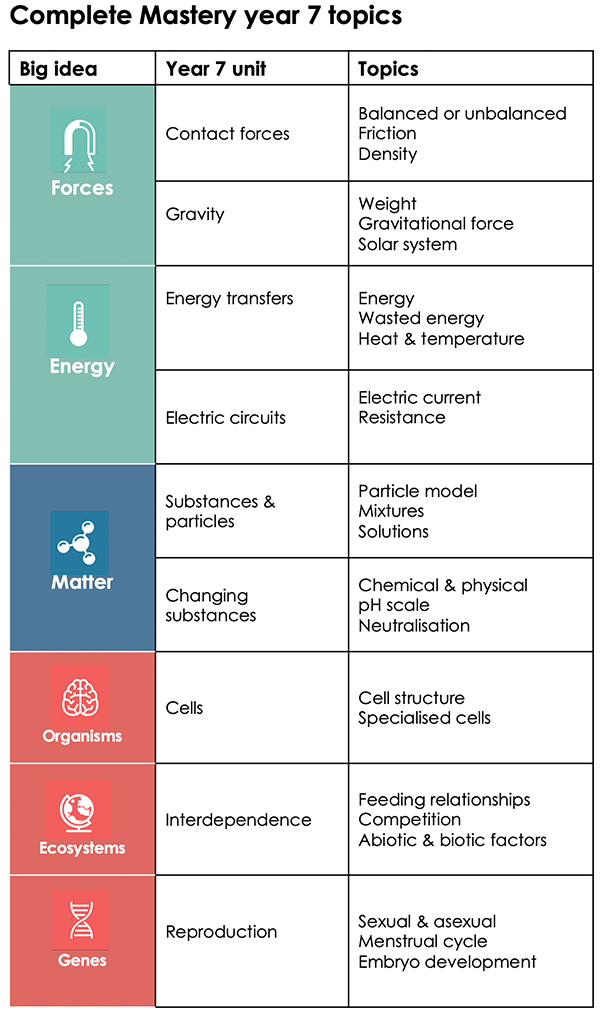
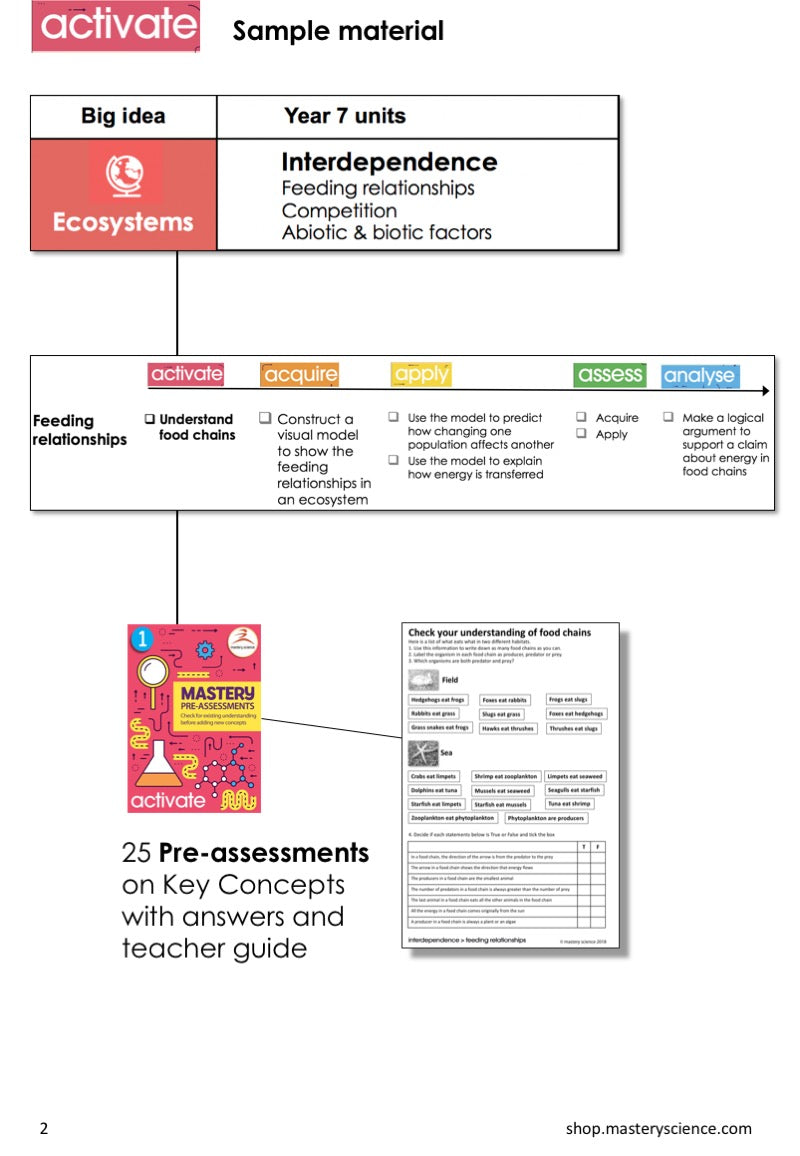
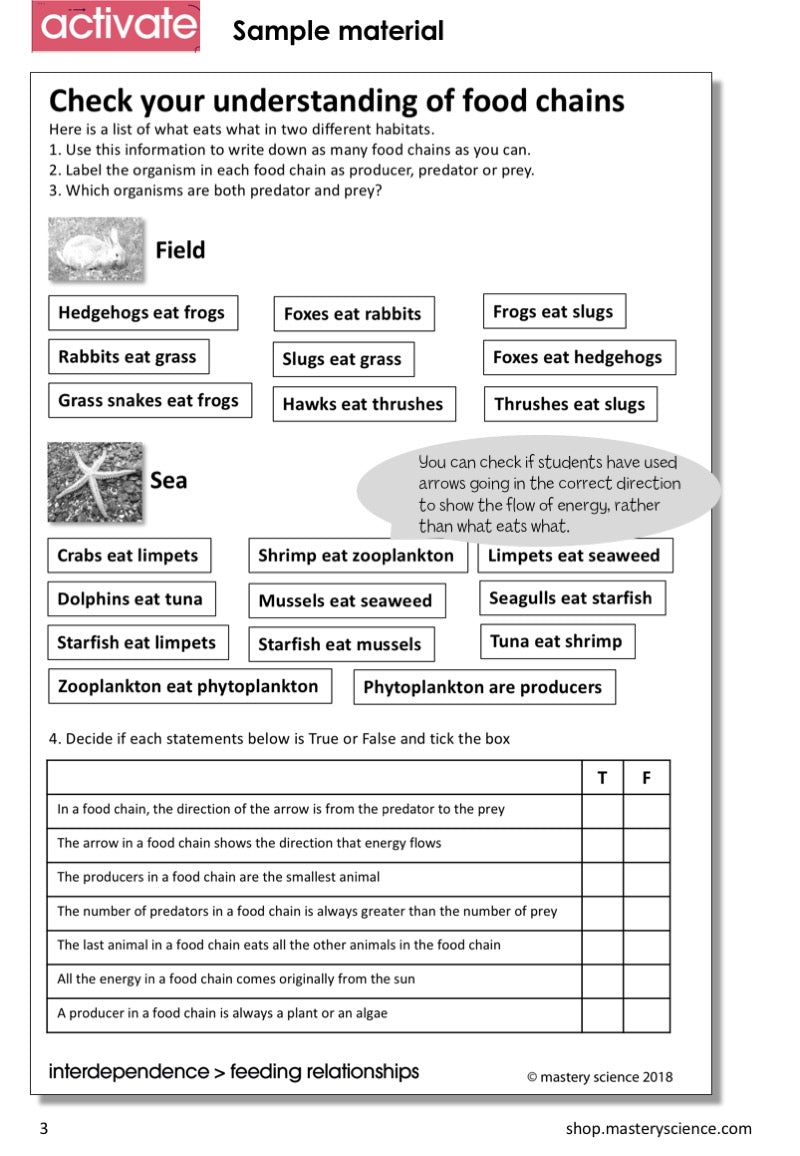
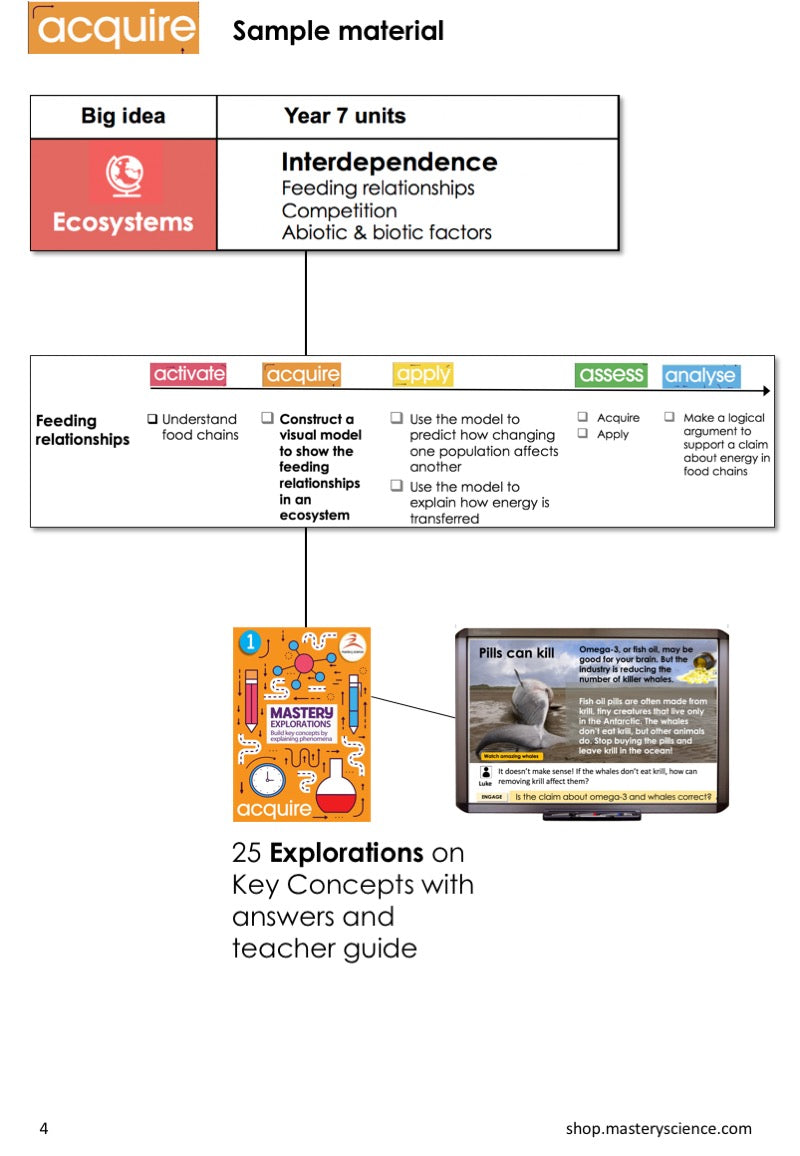
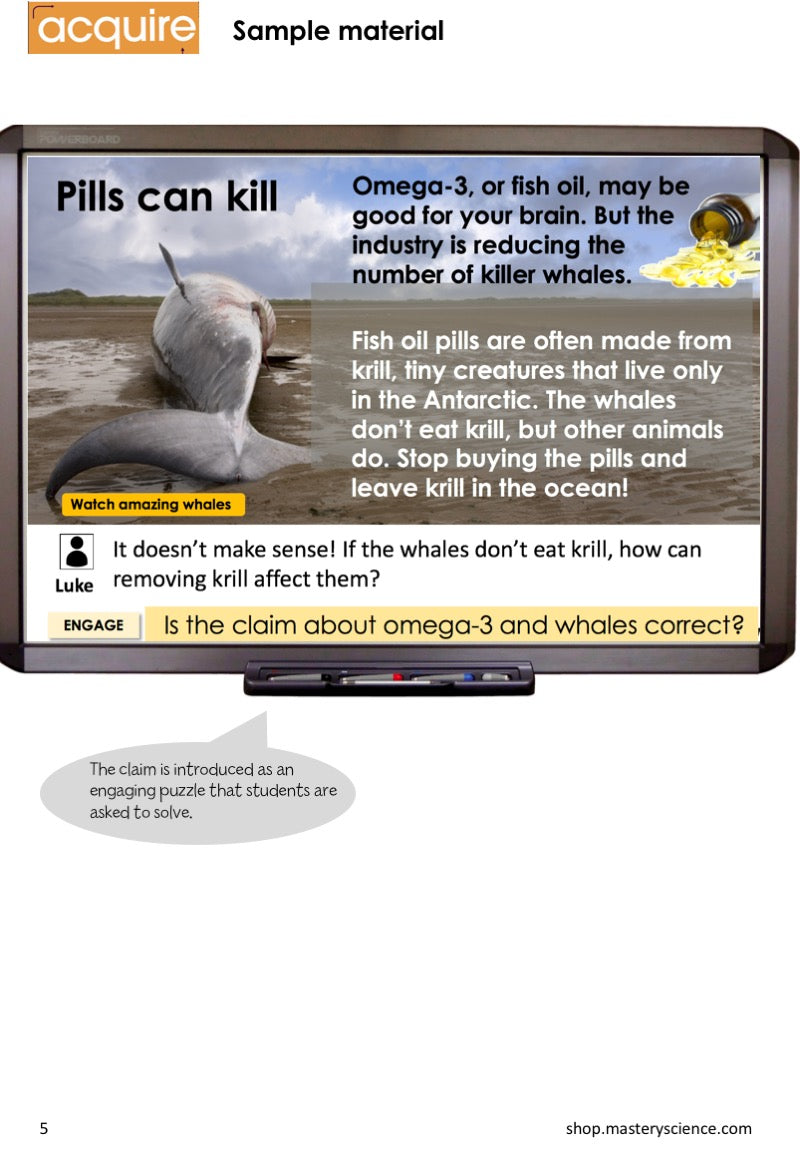
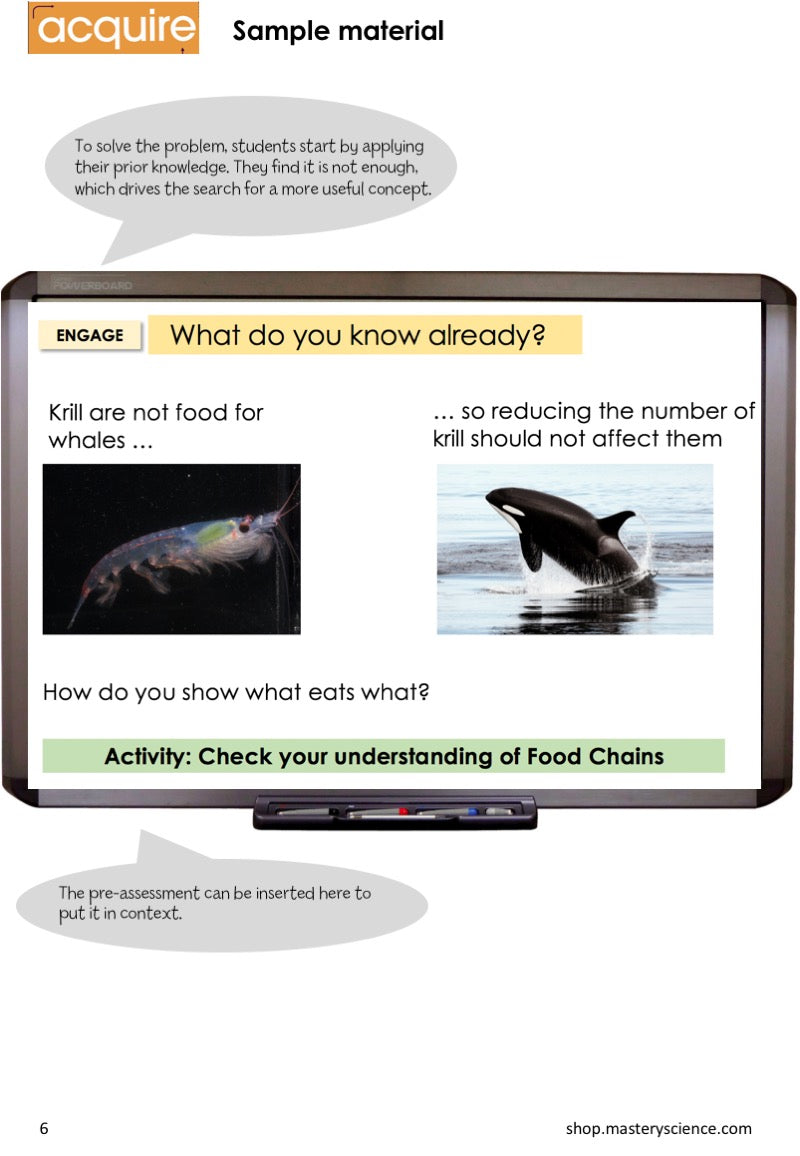
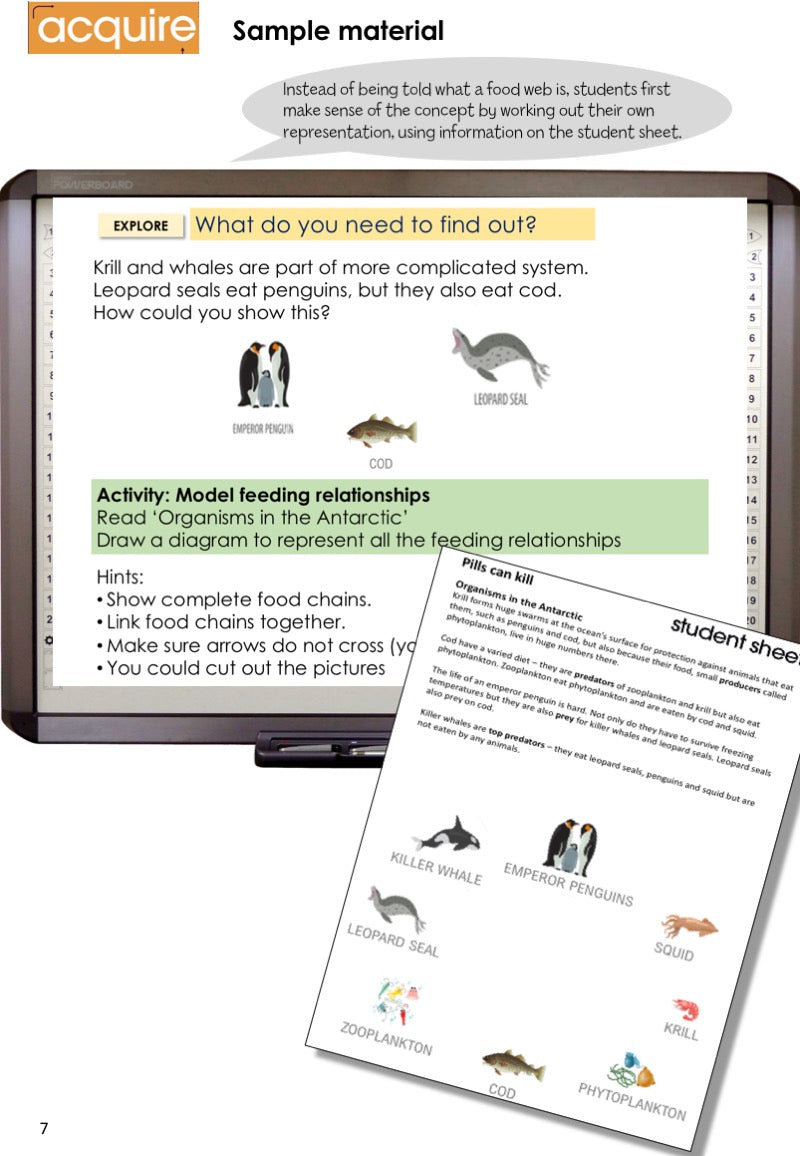
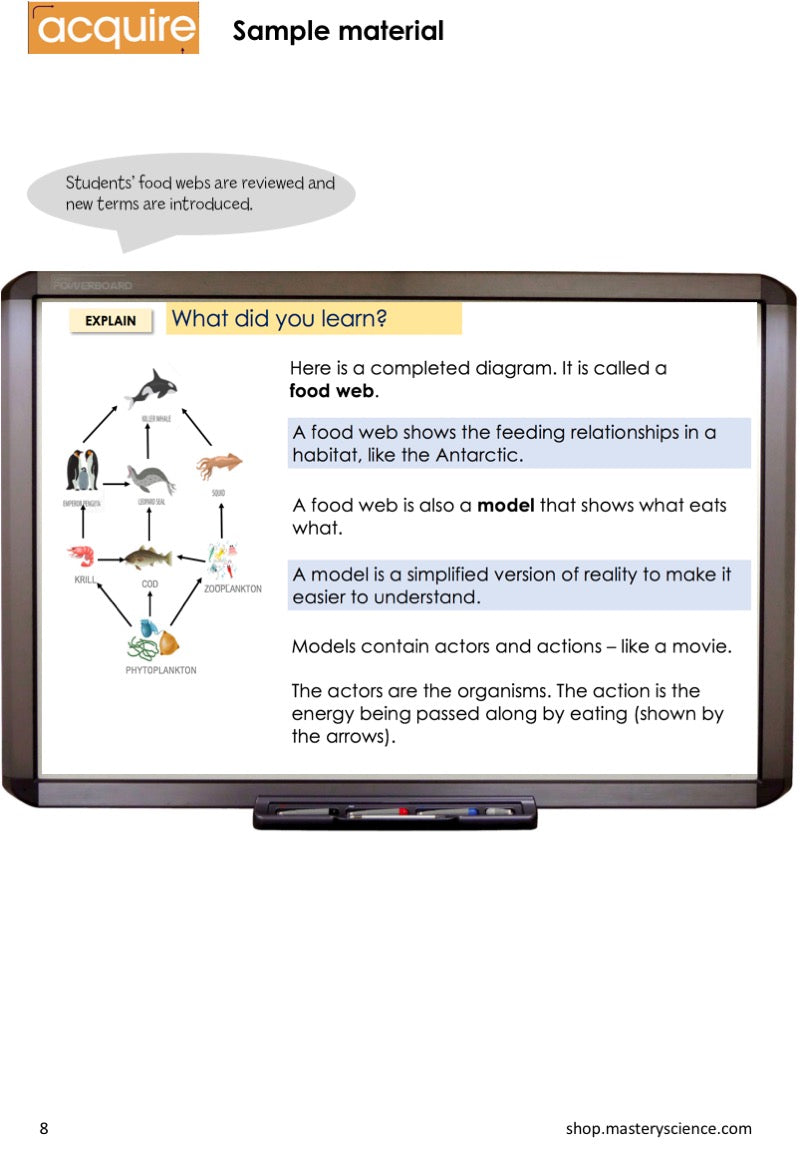
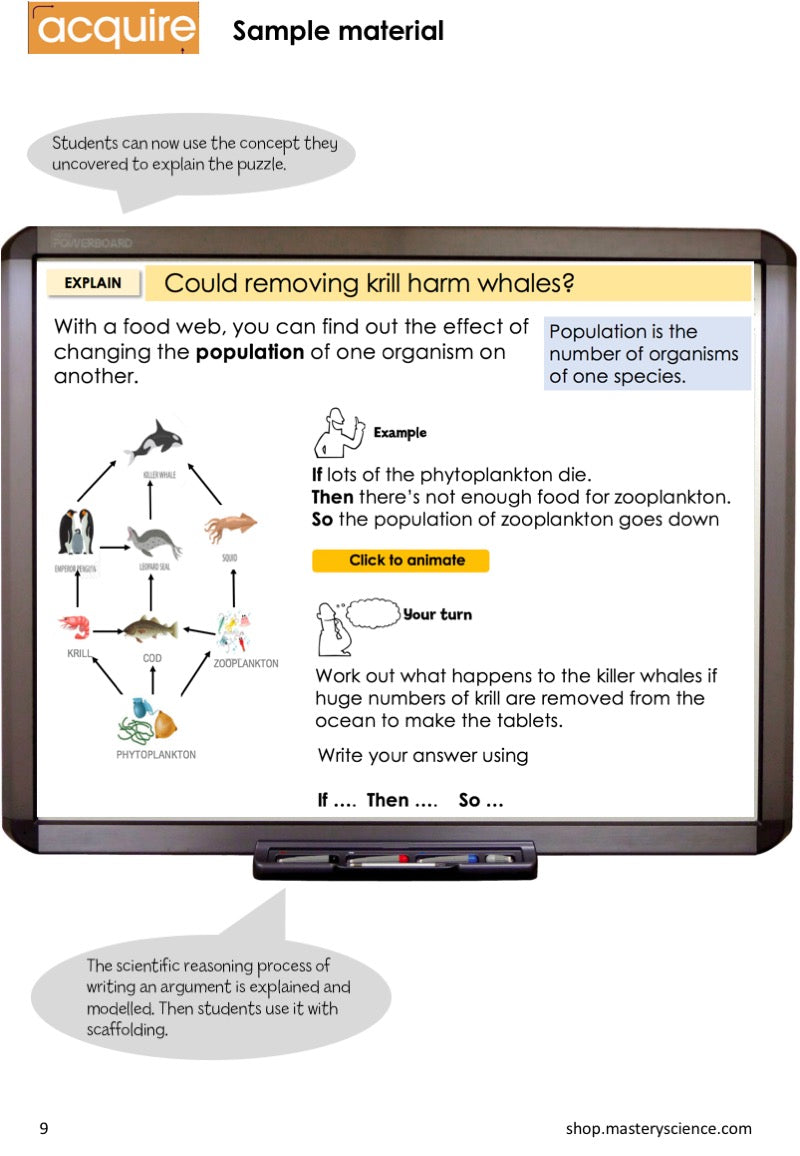
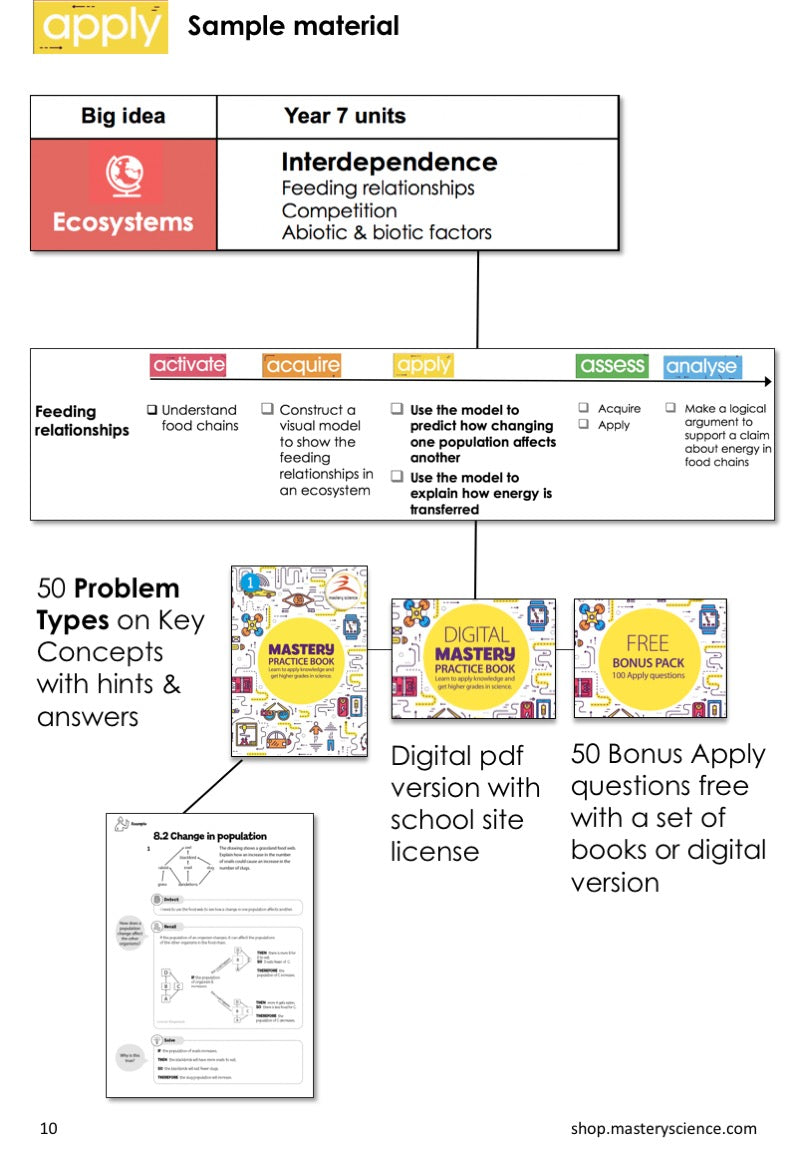
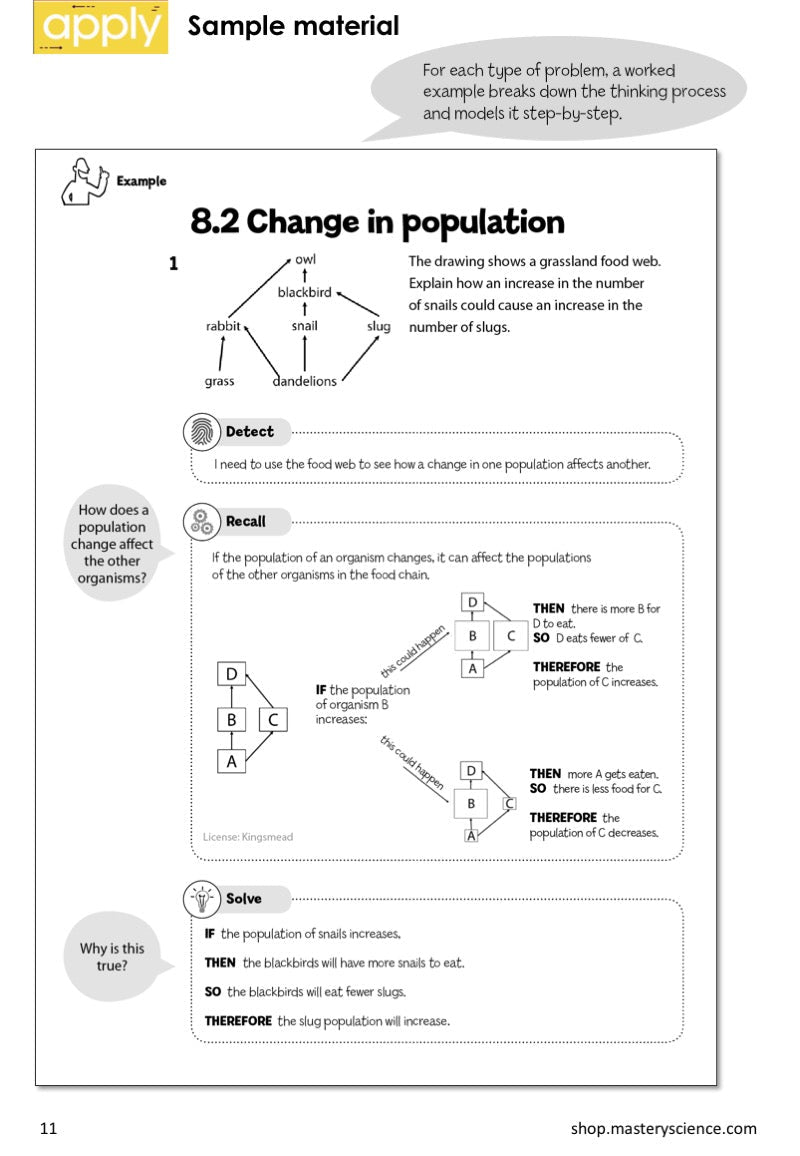
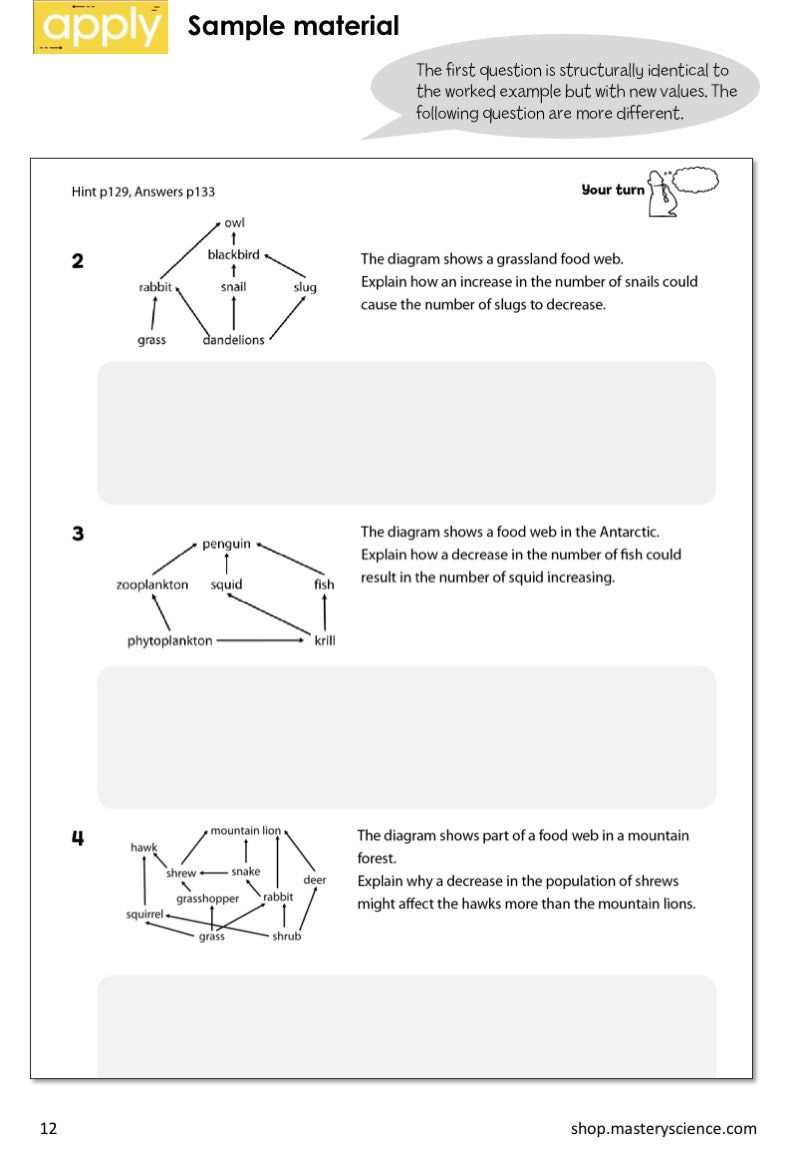
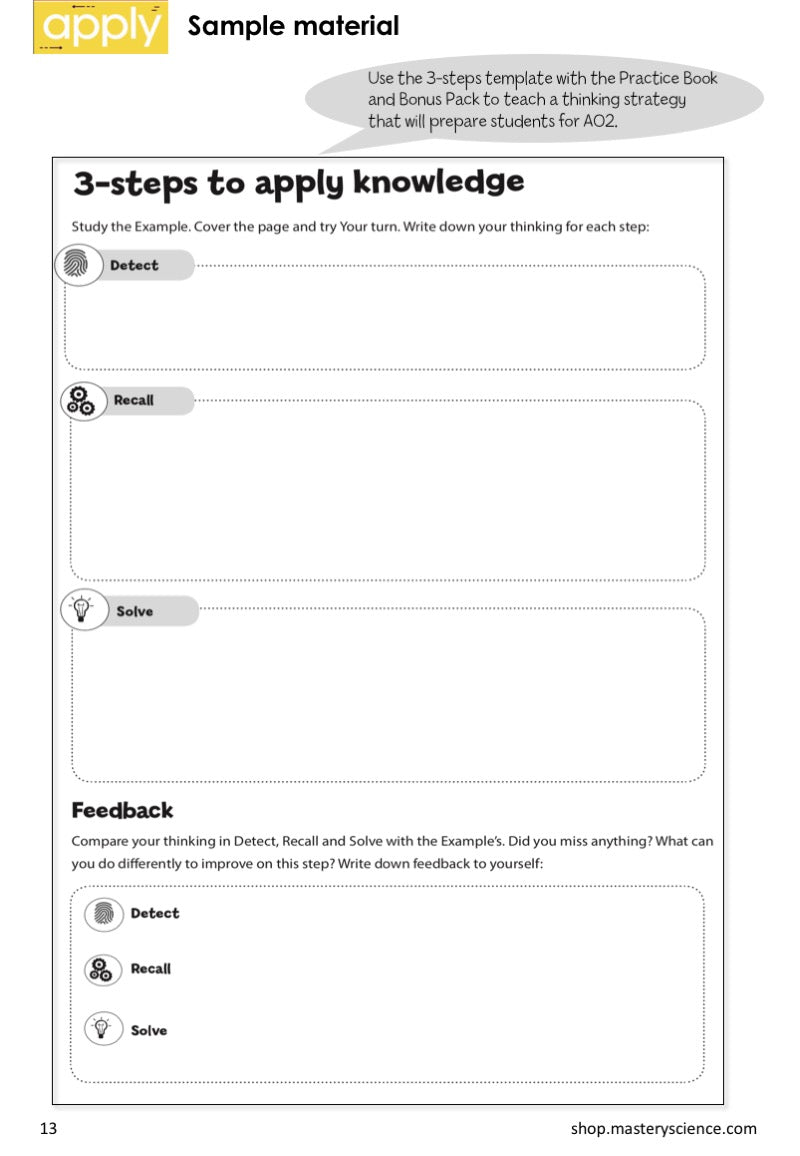
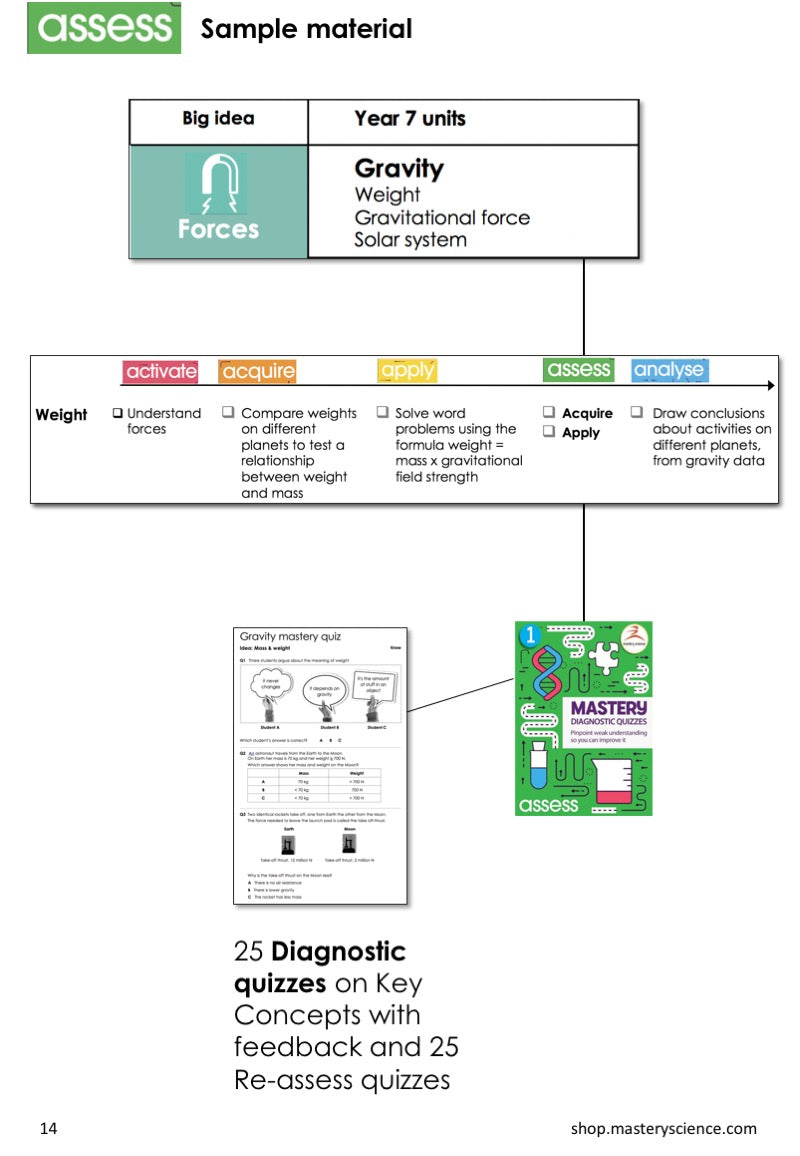
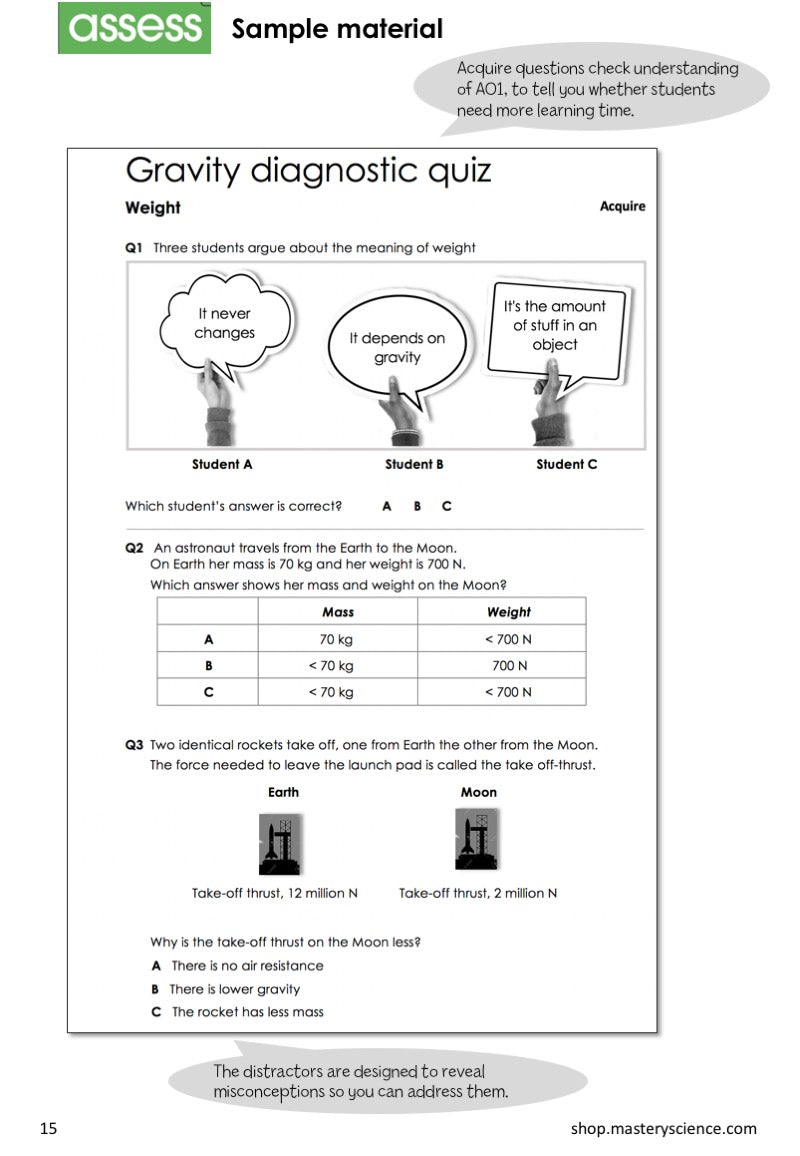
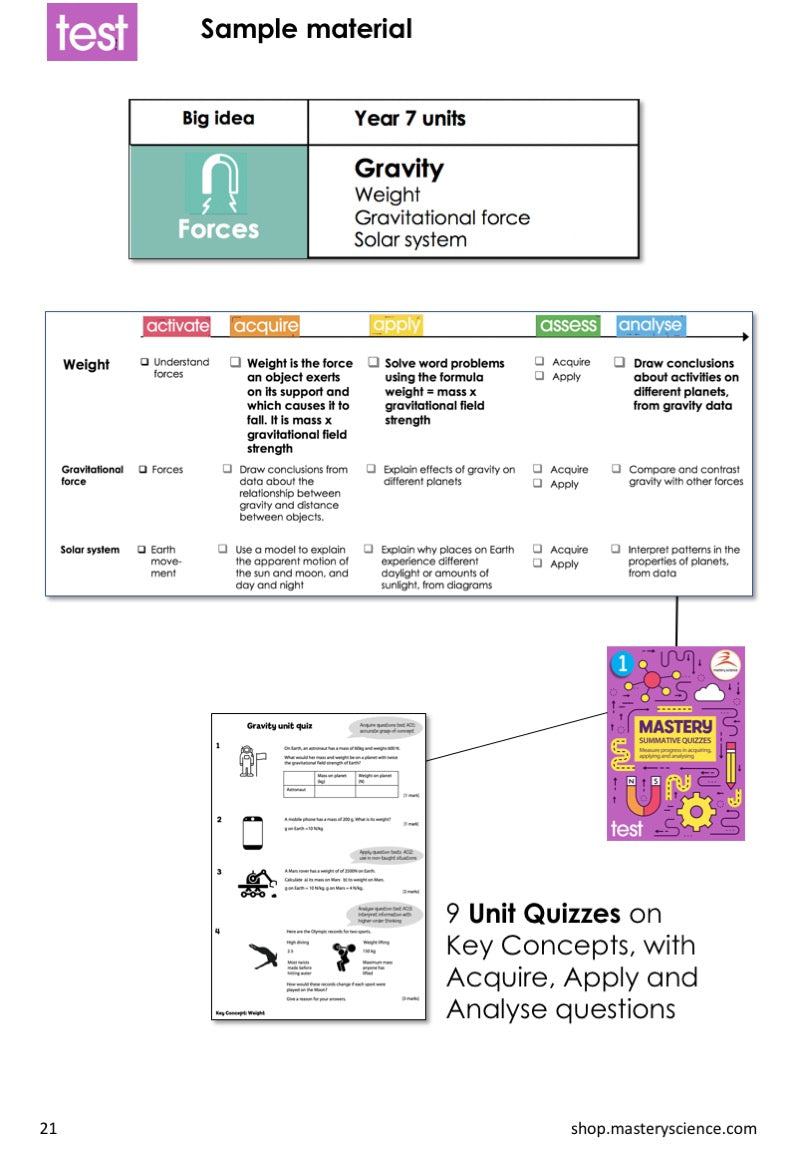
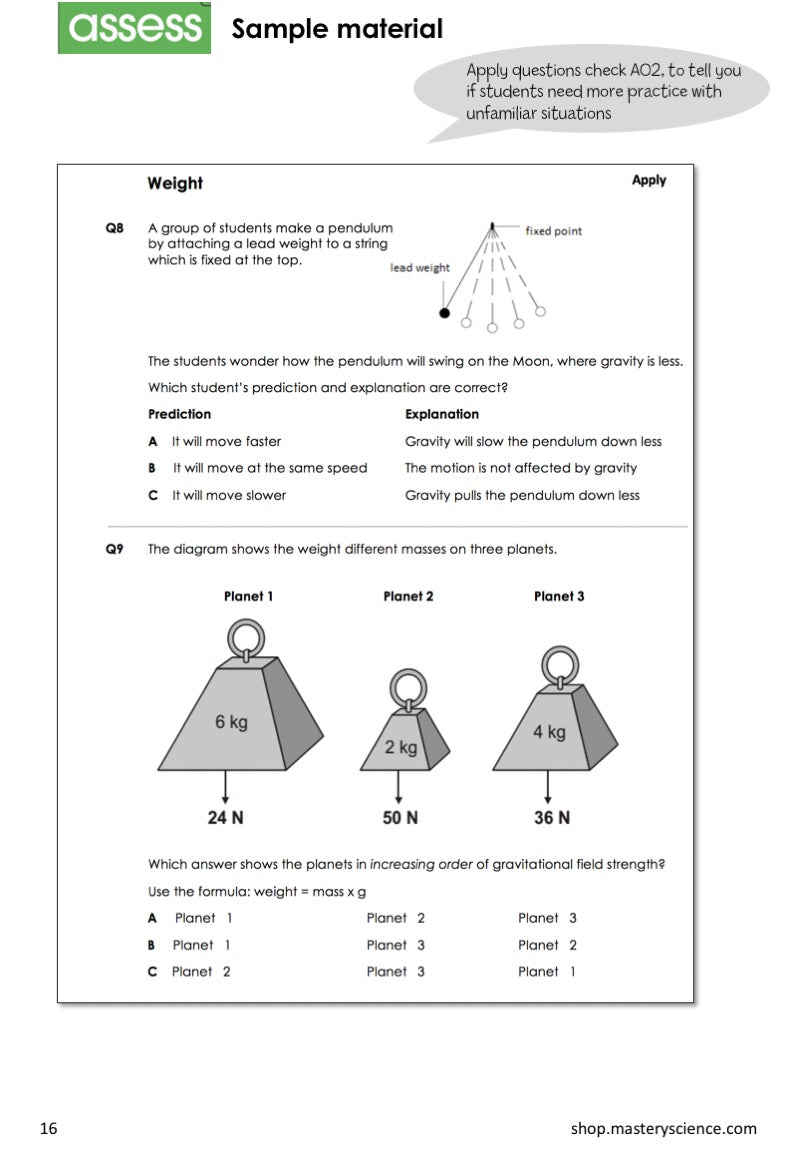
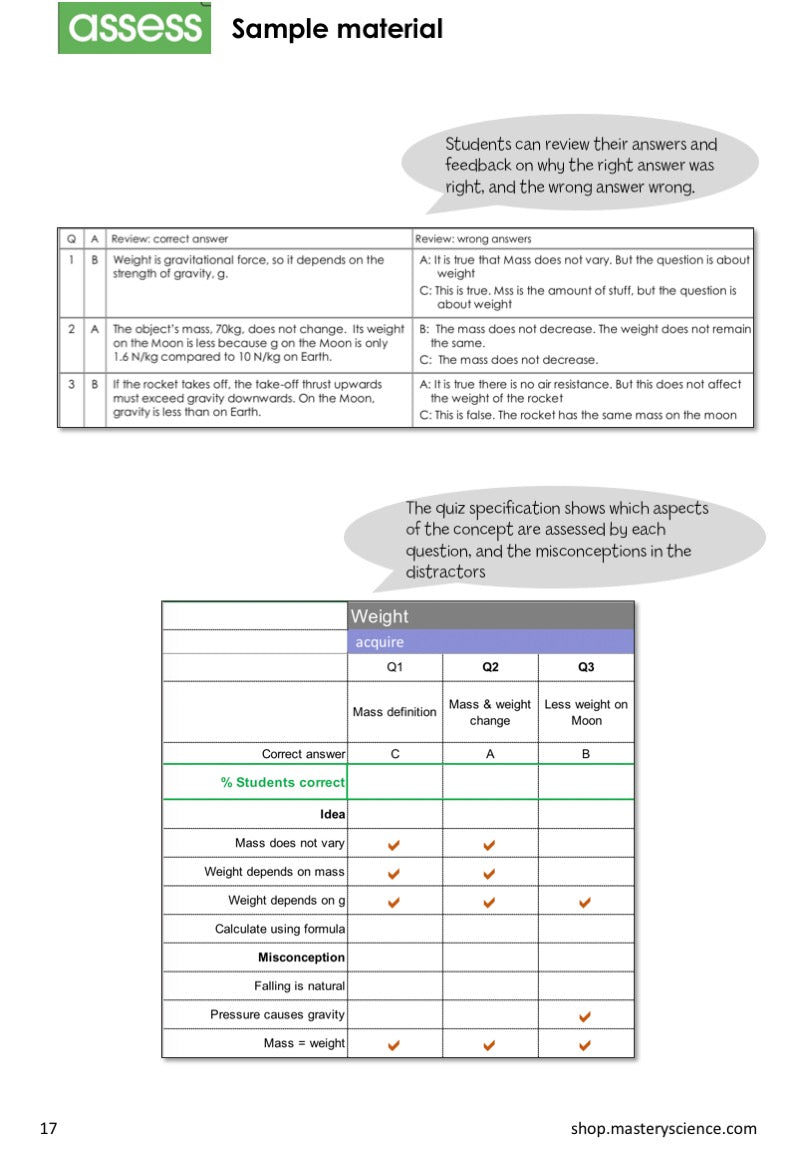
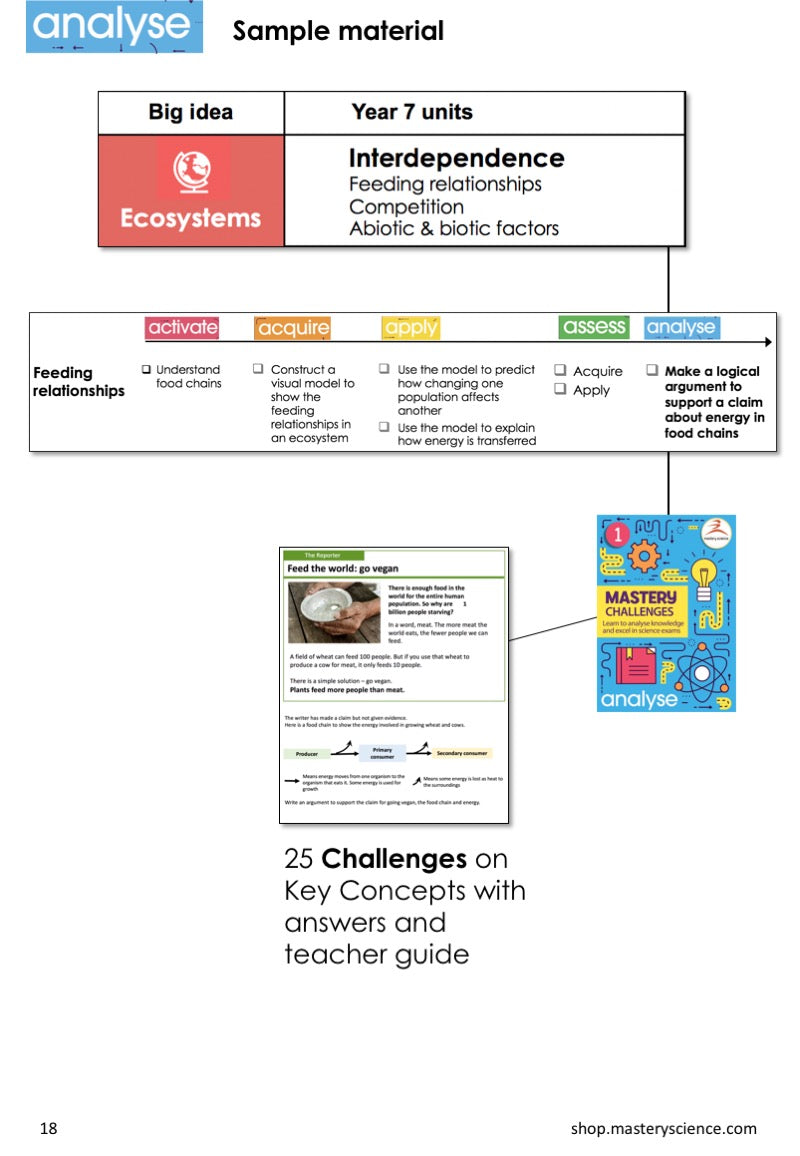
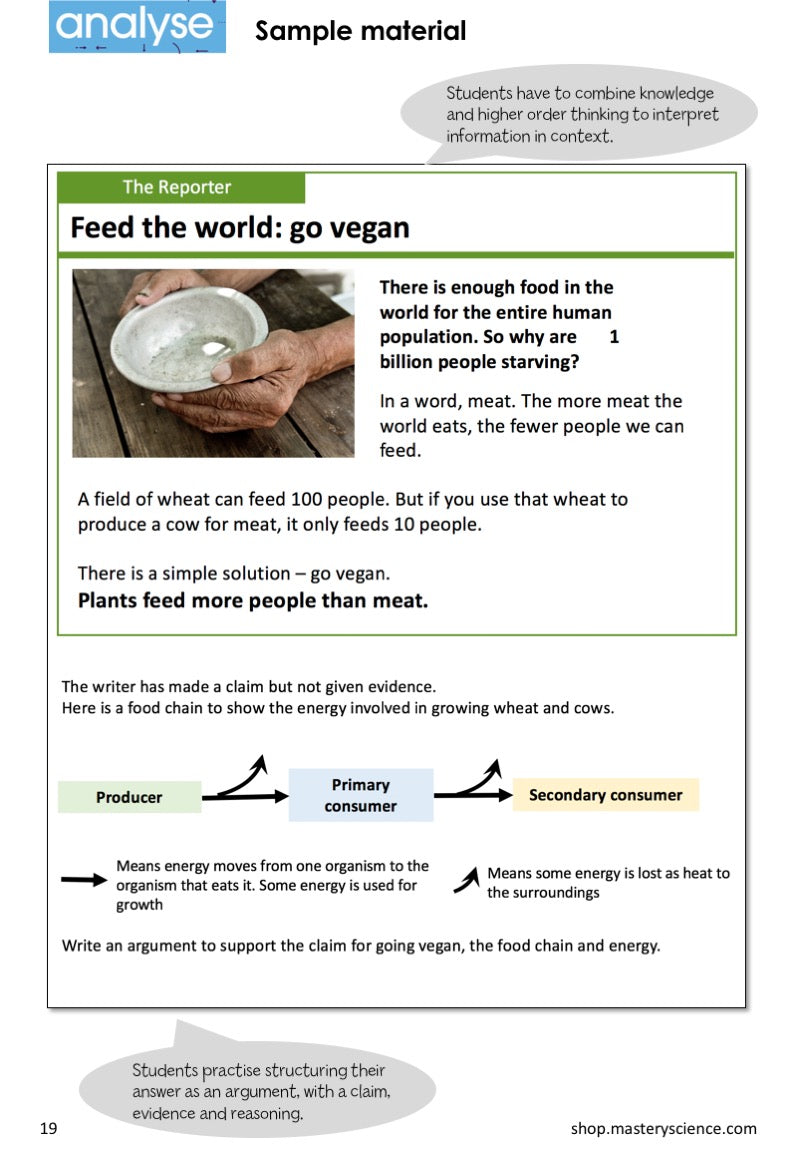
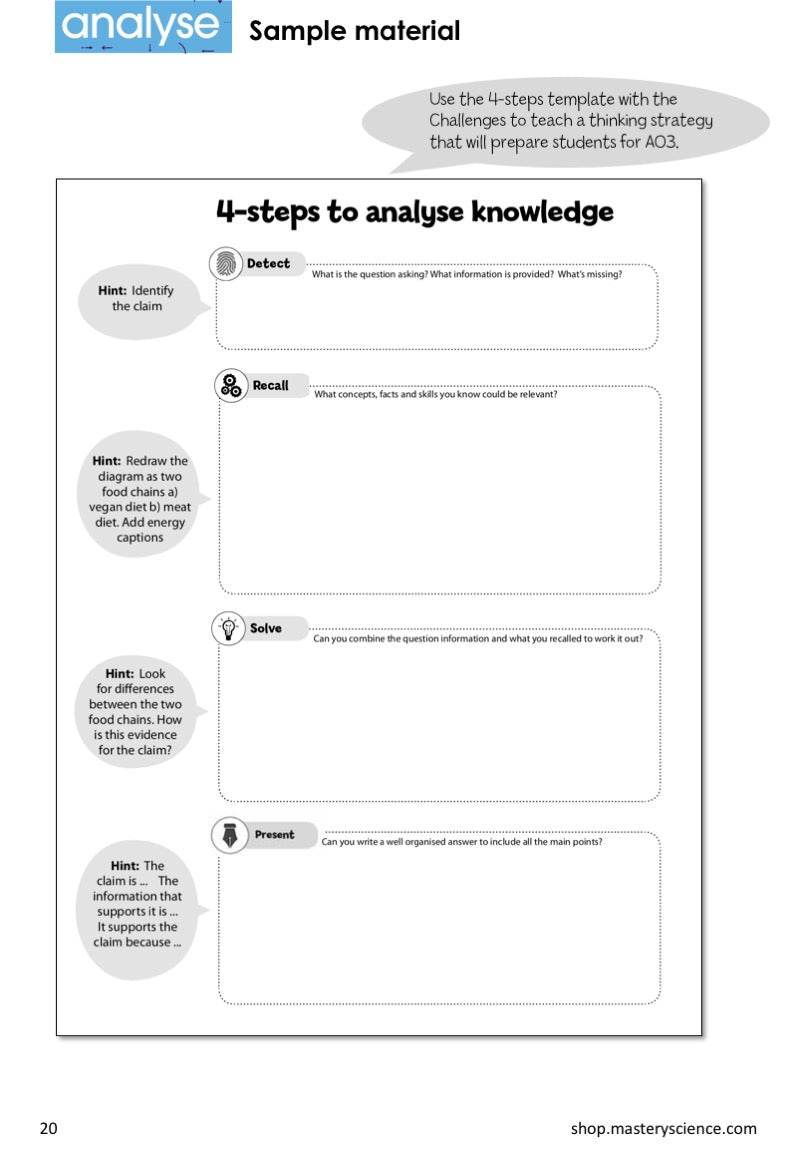
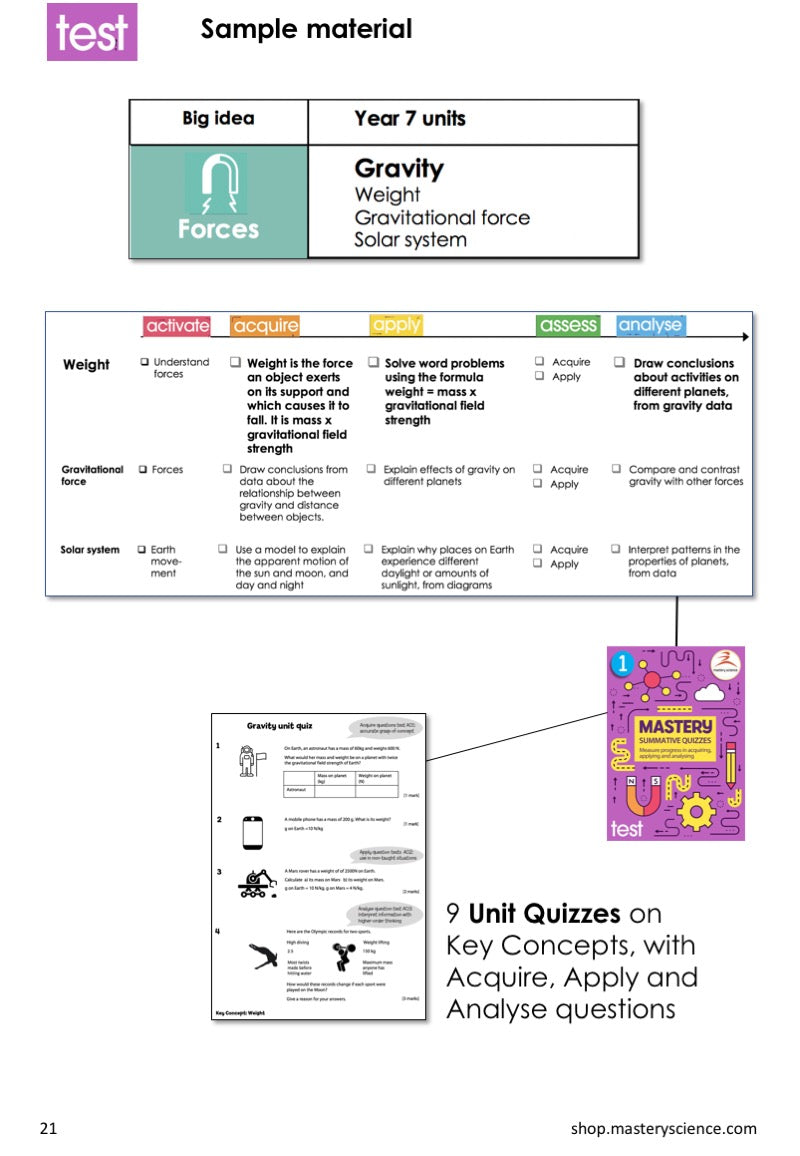
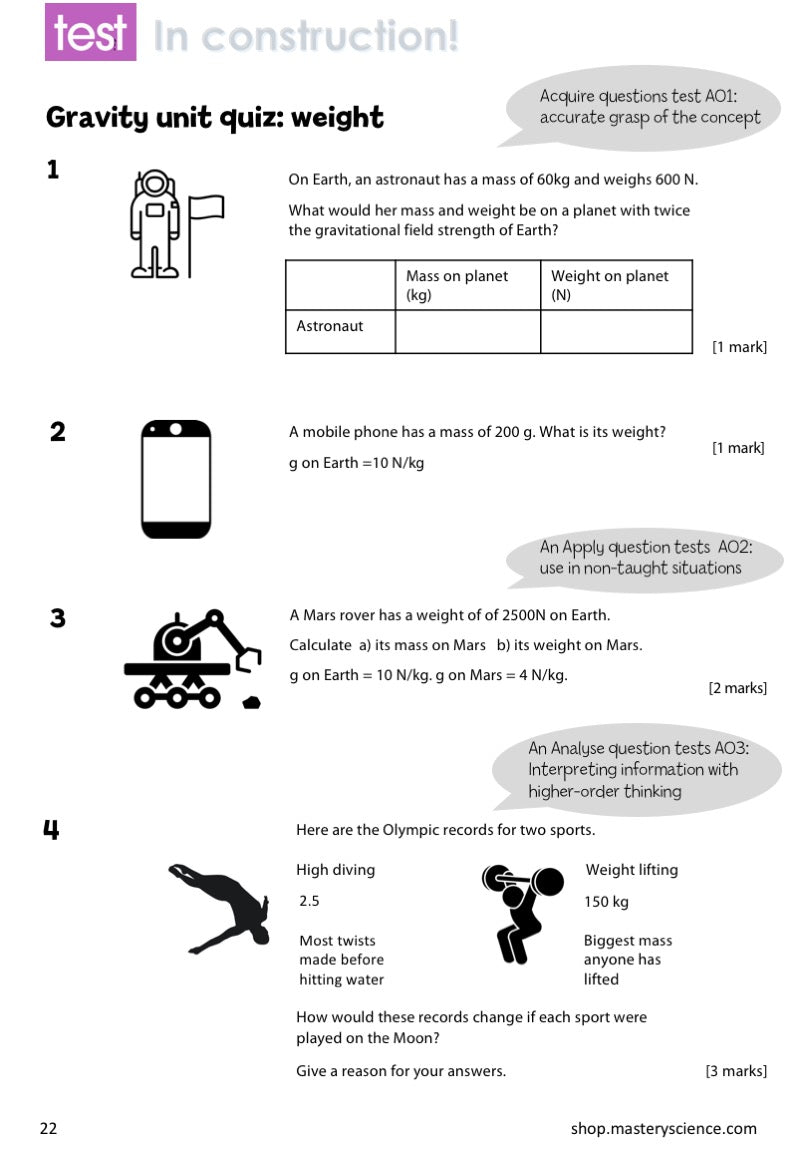
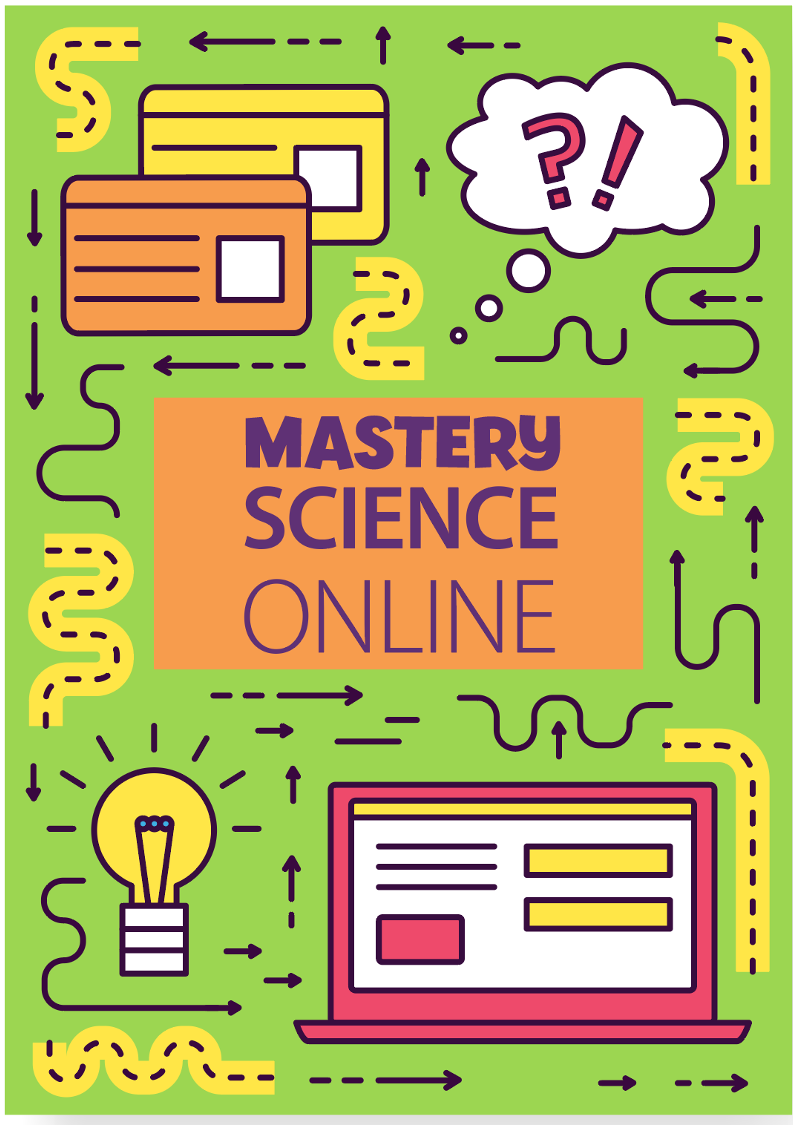
Q&A
For the Year 7 Mastery Practice book:
For the Y9/GCSE Mastery Practice Book:
It was written to help year 7 students learn to transfer the scientific knowledge to unfamiliar situation. It can also be used by students in other years to improve their understanding of the fundamental concepts. Learning to apply is what will give students access to the 60% of marks at GCSE that demand more than recalling content. The book uses a research-based approach to teach students how to solve different types of problems.
The Practice Book has a chapter on each unit in the year 7 curriculum, based on a 5-year curriculum and AQA's KS3 Science Syllabus. Download the sample material to see exactly what concepts and types of problems are included.
The first strategy studente need to learn is to evaluate the problem and what knowledge is needed to solve it. 'Detect' simulates how an expert looks at a question. They make sense of the situation, look beyond the superficial details to find the deep structure This allows them to recognise this as an example of a problem type they have seen before, and recall the organised information they need to solve - key concepts. It ensures that students avoid their inclination to just look at the keywords, and dive in risking misunderstanding the situation. Detect is broken down into smaller steps, usually: draw a diagram, show values, identify unknown, decide the concept
This encourages students to bring into their working memory all their existing knowledge, externalise it on paper (to reduce working memory demands), and then home in on what's relevant to solving the problem.
The third stage of the problem solving strategy is the actual solution process using the knowledge from Recall.The Solve starts by showing how to use the knowledge from Recall and models a step by step process of moving towards a solution for the problem.We teach students how to write answers scientifically, using a variety of structures like claim-evidence-reasoning, and problem-solution, and cause-effect.
We give a big discount if you want to buy 30+ books. Please contact us.
























